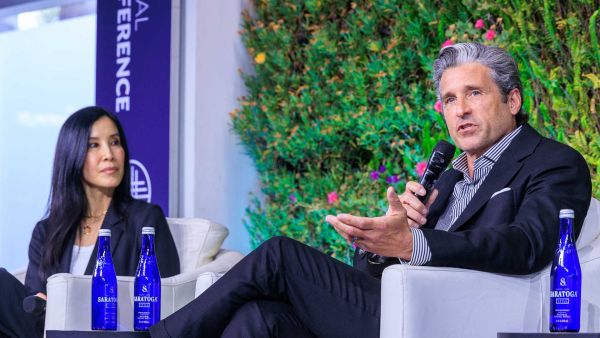
Lisa Ling (left) talking to Patrick Dempsey (right) at the 28th Milken Institute Global Conference in Los Angeles, California
In This Edition:
Events Recap
2025 Milken Institute Global Conference
The 28th annual Milken Institute Global Conference convened leaders, innovators, and influencers across various sectors, including health, finance, policy, technology, business, and philanthropy, to tackle urgent issues and explore sustainable opportunities for shaping a more resilient future. Among the more than 200 sessions throughout the conference, the Future of Aging curated two public and two private sessions, detailed below.
From Experience to Excellence: Women Redefining Business and Wellness
Women represent one of the fastest-growing entrepreneurial segments, leveraging decades of experience, deep expertise, and extensive networks. Their impact is further amplified by the support of trailblazing female founders, high-profile celebrities, Fortune 500 executives, and leaders in the private sector. Whether driven by passion, responding to workplace ageism, or seeking greater flexibility for work-life balance, women are proactively securing their health and financial futures while leading their families, workplaces, and communities. Hear the strategies and insights women business leaders have deployed in navigating challenges and opportunities of modern business while adopting lifelong strategies for optimizing healthy longevity.

Left to right: Sheryl WuDunn, cofounder, FullSky Partners, co-owner, Kristof Wines (moderator); Sheila Marcelo, CEO and cofounder, Ohai.ai; Lauren Miller Rogen, filmmaker, cofounder, Hilarity for Charity (HFC); Penny Pennington, manager, Ohai.ai, partner, Edward Jones; Michele Trogni, CEO, Zinnia
Roadmap to Longevity
As lifespans increase, so does the focus on ensuring that those endowed with extra years live them in good health. High-end longevity clinics aiming to slow down aging are sprouting up around the globe. GLP-1 drugs are touted as therapies potentially targeting multiple pathways involved in the aging process, and advances in the fight against Alzheimer’s disease and other dementias are providing new hope. Hyperbaric chambers, cryotherapy, regenerative medicine, and more are among recent innovations. At the same time, a focus on prevention involving lifestyle practices—think of regular exercise and nutrition-rich diets, fostering social connections, and cultivating a sense of purpose—remains a reliable path to healthy aging. Watch this session to learn from leading longevity experts about the latest breakthroughs and what’s on the horizon in the quest to live to a healthy 100 years.
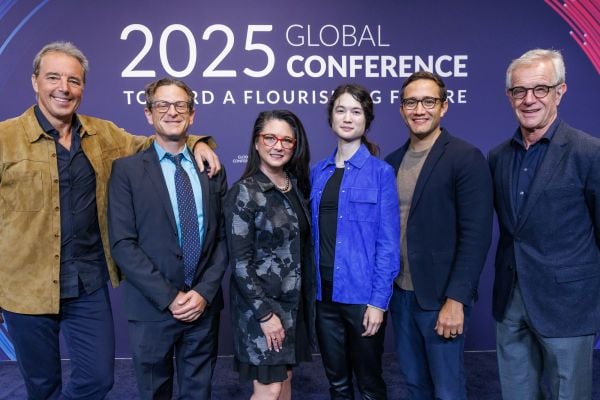
Left to right: Dan Buettner, founder, Blue Zones, LLC; Richard Isaacson, director, Atria Precision Prevention Program; Vonda Wright, orthopedic surgeon, founder, Precision Longevity; Laura Deming, CEO, Cradle; Gadi Schwartz, correspondent, NBC News (moderator); Eric Verdin, CEO and president, Buck Institute for Aging
Private Equity and Patient Care: A Delicate Balancing Act (Invite only)
In the evolving health-care landscape, the intersection of private equity investment and patient care demands a nuanced approach that balances public benefit with the profit interests of investors. As stakeholders navigate the complex economic and health challenges facing the industry, fostering transparency and collaboration becomes paramount. This panel examined how private equity can be a catalyst for innovation and operational efficiency while ensuring that a primary focus is on patient well-being and accessibility.
The Future of Aging team is working on an issue brief synthesizing our insights from this session and the private session on this topic that took place at the 2024 Future of Health Summit. This report will be released in advance of the 2025 Future of Health Summit.
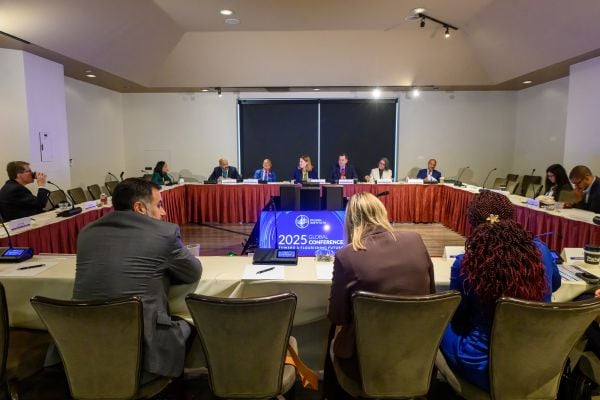
Left to right: Omar Lateef, president and CEO, Rush University Medical Center; Kneeland Youngblood, founding partner, Pharos Capital Group; Dawn Carpenter, director, Financial Longevity, Milken Institute Future of Aging (moderator); Jesse Ehrenfeld, president, American Medical Association; Sandra Hernandez, president and CEO, California Health Care Foundation; Joseph Betancourt, president, the Commonwealth Fund
Future of Aging Advisory Board Meeting | Family Caregiving Reimagined: Every Sector, Every Solution (Invite only)
The Milken Institute Future of Aging Advisory Board brings together influential leaders from our Leadership Council and Academic and Policy Council in a premier forum to accelerate innovations in aging, scale promising solutions, and champion individual, institutional, and societal preparedness for longer lifespans. With more than 50 million Americans providing unpaid care to the elderly and other family members in need—an economic contribution exceeding $600 billion annually—supporting caregivers is both a social and an economic imperative. Caregiving spans generations, cultures, worker types, and income levels. This session explored where innovation is making a real impact, from forward-thinking workplace policies and practices to cutting-edge technologies to evolving strategies in finance and philanthropy. Advisory Board members and industry leaders highlighted the most promising advances—and what’s next in building a more sustainable, supportive caregiving infrastructure.
The meeting also introduced the Young Leaders Committee, an intergenerational initiative operating under the Future of Aging Advisory Board to support and engage rising leaders focused on aging and longevity. Inaugural members include: Anna Abillama Frankowska (Graceful Finance), Ariane Tom (Kaleida Capital), Moshe Itzhakov (Weinreb Ventures Holdings), Omar Abudayyeh (Harvard University), and Sourav Sinha (Longevity Vision Fund).
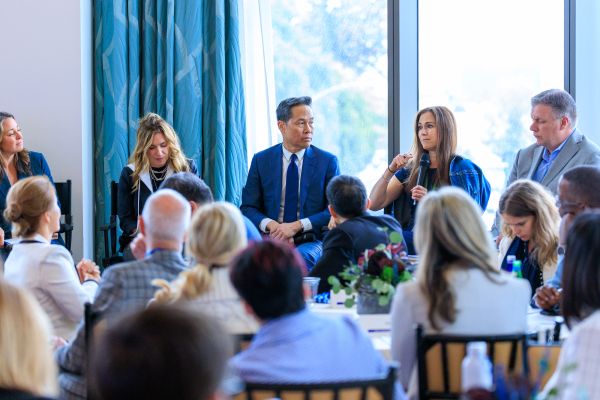
Left to right: Lauren Dunning, director, Milken Institute Future of Aging (co-moderator); Alexandra Drane, cofounder and CEO, ARCHANGELS; Richard Lui, news anchor, FinTech founder; Lindsay Jurist-Rosner, cofounder and CEO, Wellthy; Trent Stamp, CEO, the Eisner Foundation
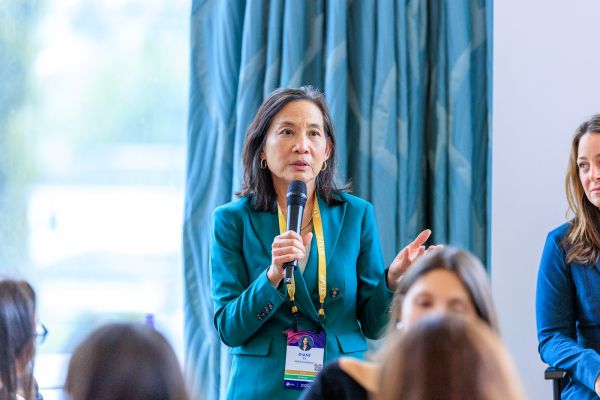
Diane Ty, managing director, Milken Institute Future of Aging (co-moderator)
New Publication
The Future of Connected Care: Enabling Healthy Longevity and Aging at Home
The newest report from the Milken Institute Future of Aging offers a blueprint for how to harness the potential of digital health tools, smart-home technologies, and AgeTech to address older adults’ preferences for aging at home and the societal imperative to care for an aging population of 58 million and growing in the US. This report, made possible through the support of Samsung, is informed through a comprehensive research process, including 50 expert interviews, a 25-person roundtable, and an extensive literature review.
The Future of Connected Care: Enabling Healthy Longevity and Aging at Home presents six building blocks for action and identifies how public and private-sector stakeholders can contribute to advancing the connected care ecosystem. Our recommendations focus on:
- Characterizing the needs and preferences of older adults alongside related connected-care tools
- Establishing the infrastructure and shared frameworks to validate and link solutions
- Enabling widespread adoption through improved access, integration, and financing.
Coinciding with the release of this new report during Global Conference, the potential and opportunities of a connected-care ecosystem were the topic for discussion by the “Unlocking Health Data” panel. On connected care in the home, Hon Pak, senior vice president and head of Digital Health Team, Mobile eXperience Business at Samsung Electronics, said: “We talk about connected devices and the data connecting people to each other, which brings humanity into the picture, and then connecting the services in a way that makes health care simple.”
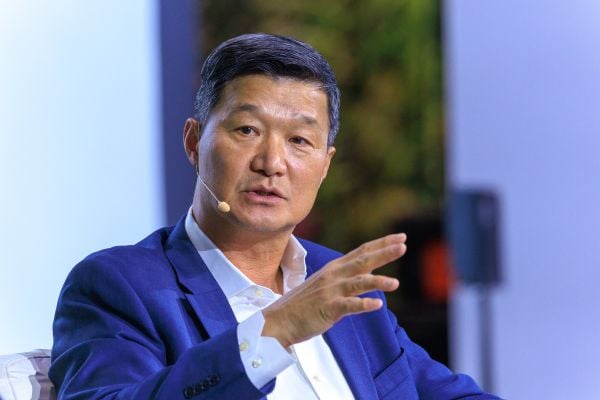
Hon Pak spoke at the Milken Institute Global Conference in May 2025
Select Project Updates
Alliance to Improve Dementia Care
The Alliance to Improve Dementia Care continues to serve as a point of alignment for a cross-sector coalition consisting of industry, health systems, government, research, advocacy groups, and individuals to identify best practices and advance policy goals.
Here are some of the exciting developments from the field that have been presented in our monthly Alliance meetings:
- The Dementia Data Hub, a new surveillance system for all types of dementia, was originally funded by an NIA grant. The system uses Medicare claims to categorize the likelihood of a dementia diagnosis.
- The Alzheimer's Disease Neuroimaging Initiative is celebrating 20 years of its contributions to the field through validating biomarkers, advancing diagnostics, and providing evidence-based practices.
- Apple Health and Biogen’s remote observational study—Intuition led by Paul Monroe Butler, MD, PhD, examined the impact of smartwatch- and smartphone-based assessment of brain and health on the early detection of mild cognitive impairment.
We are also excited to share some select impacts Alliance members and individuals are making in the field:
- The Dementia Discovery Fund reached its funding target of $250 million for DDF-2.
- The Institute for Healthcare Improvement surpassed 5,000 care locations recognized as Age-Friendly Health Systems. With support from the John A. Hartford Foundation, the Institute for Healthcare Improvement launched the Age-Friendly Health System Community, a free-to-join network that serves as an opportunity to learn how to adapt the 4Ms (What Matters-Medication-Mentation-Mobility) in a health-care setting.
Caregivers in the Workplace
Caregiving was covered as an important issue of our time during the recent Milken Institute Global Conference.
In a fireside chat with Patrick Dempsey, the actor discussed his mother’s cancer journey and experiences he had as a family caregiver, which inspired him to found the Dempsey Center, a care facility in Maine that focuses on treating patients holistically at no cost. This type of care is intended not only for a patient but also for their entire caregiving network. He also highlighted the need for compassionate care and community support, noting the rise in cancer diagnoses and the impact of stress on patients' well-being.
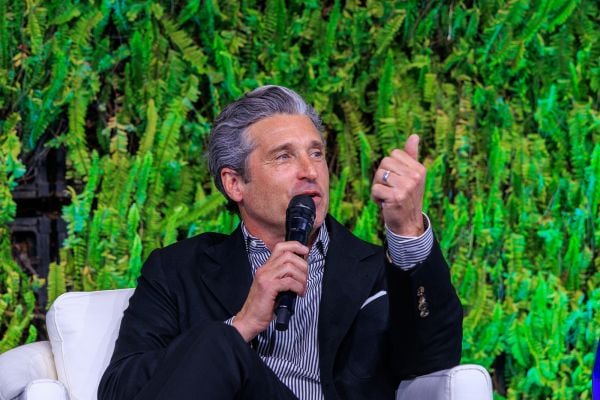
Patrick Dempsey spoke at the Milken Institute Global Conference in May 2025
- Caregiving was the central theme of this year’s Global Conference Future of Aging Advisory Board Meeting. The session explored the challenges that caregivers are facing in the US today and the innovations and policy solutions that could shape the future of caregiving in the country.
- Adjacent to the Global Conference, NBC News Anchor and FinTech Founder Richard Lui hosted a Care Economy roundtable breakfast. The session explored the transformative potential of the care economy, including innovations in CareTech and AgeTech, to unlock up to 20 percent of global gross domestic product.
Policy Information
April 7: The LEAD Coalition and the Society for Women's Health Research submitted a jointly led public comment letter, supported by 304 signatories, including the Alliance to Improve Dementia, in response to the Food and Drug Administration’s (FDA) draft guidance for the study of sex differences in the clinical evaluation of medical products. This letter emphasized the need for a comprehensive framework that considers sex as a fundamental variable throughout drug and device development, approval, and post-market processes for Alzheimer’s disease and related forms of dementia.
New Team Member
Please join us in welcoming Chris Multerer to the Future of Aging team as a senior associate for Marketing and Communications. In addition to managing communications for the Future of Aging, Multerer will support its robust programming at events throughout the year.
Previously, he worked as a contractor for the US Agency for International Development, leading communications work for the Agency’s Center for Conflict and Violence Prevention. He also served as fundraising campaign manager for a development consulting firm. Multerer holds an MA in international development from University College Dublin, Ireland.
Thought Leadership
This section showcases articles, media highlights, and more, featuring Milken Institute Future of Aging leaders as speakers, authors, or expert interviewees.
External Events
February 20: Diane Ty, managing director, Future of Aging, spoke during Hilarity for Charity’s CareCon on “The State of Care.” View a recording of the conversation here.
March 12: Ty delivered the lunchtime keynote virtually on “Future of Aging: Healthy Longevity & Financial Security” for the Duke Corporate Education Lead with Her event. View a recording of the session here.
March 28: Paul Irving, senior advisor, Future of Aging, moderated a panel for the USC Leonard Davis School of Gerontology AgeTech Symposium, “Startups Addressing Solutions for Caregivers.”
April 30: Ty delivered a keynote at the National Partnership for Healthcare and Hospice Innovation (NPHI) Annual Summit on the trends shaping the future of aging.
May 13: Ty spoke during a congressional briefing hosted by the Society for Women’s Health Research (SWHR) on Alzheimer’s disease, “Early Signs, Lasting Impact: Policy Pathways in Alzheimer’s Disease Detection and Care.”
May 19–20: Michael Brown attended the Davos Alzheimer’s Collaborative US Fellowship workshop as part of the Alliance to Improve Dementia Care. This strategic partnership supports health systems and health plans in addressing the barriers to early detection of cognitive impairment in primary care.
May 22: Ty recorded a webinar for Bank of America on Housing in Retirement to discuss how an aging population can prepare for longer retirements. The recording was aired to Bank of America employees on May 22.
May 28: Ty spoke on a panel at a virtual event for the Wharton Club of New York: “Planning for Housing in Retirement—Eldercare and Self-Care.” The event examined the impact longer retirements will have on housing choices for older adults.
Podcast Interview
May 13: Lauren Dunning was interviewed on the Glowing Older podcast by the host Nancy Griffin about intergenerational connections—why they matter, how we foster them, and how technology can create new opportunities and possibilities.
June 2: Dunning appeared on the Positive Aging Community Podcast to discuss the release of the Future of Connected Care: Enabling Healthy Longevity and Aging at Home report.
Media Highlights
March 19: An Employee Benefit News article, “Dementia Prevention Starts in the Workplace,” references the Milken Institute Future of Aging report on improving early detection of dementia.
April 4: Ty was quoted in Next Avenue’s article, “What Trump’s Policies Mean for Older Workers and Jobseekers.” The article assesses what the president’s second term could mean for workers of all ages.
May 5: Ty and the Milken Future of Aging, as well as the Alliance to Improve Dementia Care, were mentioned in a Worth Magazine article, “Global Efforts in Brain Health Emphasize Prevention, Early Detection, and Tailored Care.” The article explores the Milken Institute’s role as a leader in the brain health space.
May 11: Irving was interviewed by the Dutch daily newspaper, Trouw, on the topic: “This Community in Florida is Also Called Disneyland for Seniors.” The article examines The Villages, the fastest-growing community in the United States.
Articles
March 19: In a Milken Institute Insights article on “The Wealth-Health Connection: How Economic Status Shapes Well-Being," Dawn Carpenter, director, Financial Longevity, Future of Aging, explores the complex relationship between health and wealth and how a person’s financial well-being can influence health outcomes.
May 2: Ty coauthored “Who Will Take Care of Mom?” featured in the May edition of the Milken Institute Review. In the article, Ty examines the challenges facing our rapidly aging population, including an unprepared health-care system, a shortage of geriatric specialists, and an increasing financial toll on family caregivers. The authors propose four strategies for meeting the needs of older adults and creating a future where people live longer, healthier lives.
From Our Advisory Board
Elizabeth Blackburn, Nobel laureate and professor emerita at UC San Francisco, spoke to CBS News about the future of funding research in the United States and its importance to gaining valuable medical knowledge.
Alice Bonner, senior advisor for aging at the Institute for Healthcare Improvement, spoke to McKnight’s Long-Term Care News on the impact and future of staffing at nursing homes.
Ray Braun, president and CEO of the National Investment Center for Seniors Housing and Care (NIC), received congratulations on the success of the first-ever NIC Growth Conference in Indianapolis. The conference focused on leveraging data and analytics to meet the growing demand for senior housing.
Dan Buettner, founder of Blue Zones LLC, spoke at a “Blue Zones” kickoff event in Palm Springs, California, which unveiled a community blueprint to promote healthier living and longevity in the city. He also gave an interview with Fox News Digital on the importance of purpose to longevity.
Laura Carstensen, director of the Stanford Center on Longevity, spoke in a virtual discussion with the American Academy of Arts and Sciences on “Understanding Caregiving: How Do We Improve it from Birth Through Old Age?” The discussion centered on our relationship to receiving and giving care from infancy to the end of life. Carstensen also coauthored an article in Daedalus titled “The Human Geography of Care” for the journal’s Winter 2025 issue.
Pinchas “Hassy” Cohen, dean of the University of Southern California Leonard Davis School of Gerontology, was appointed to the Scientific Advisory Board of Niagen Bioscience, a global leader with a focus on the science of healthy aging.
Catherine Collinson, CEO and president, Transamerica Institute, coauthored the 25th annual Transamerica Retirement survey, “Retirement in the USA: The Outlook of the Workforce.” The report explores the retirement prospects for the US workforce. Collinson also spoke on the Milken Institute Global Conference panel “Addressing the Financial Headwinds Faced by Gen Z and Millennials.”
Joseph Coughlin, founder and director of the MIT AgeLab, was interviewed by Barron’s on “How to Play the Longevity Economy,” where he shared his optimism for innovation and growth in the longevity space. Coughlin also authored an op-ed for MarketWatch on the future of senior housing.
Ken Dychtwald, founder and CEO of Age Wave, participated in a Q&A with Yahoo Finance on how longevity is reshaping our outlook on retirement.
Linda Fried, dean of the Columbia Mailman School of Public Health, gave an interview with Men’s Health titled “The Life-Enhancing Power of Purpose.” Fried will be stepping down as Columbia’s Mailman School Dean after 17 years and gave a parting interview with the school on the lessons she learned in the role.
Myechia Minter-Jordan, MD, CEO of AARP, spoke about the importance of brain health and family caregiving at a symposium in which AARP joined representatives from the Vatican in addressing the challenges and opportunities of longevity.
Terry Fulmer, president of the John A. Hartford Foundation, was interviewed by Deloitte on age-friendly care for older adults. The foundation she leads provided funding for the new PBS documentary, Aging in America: Survive or Thrive.
Teresa Ghilarducci, director of the Schwartz Center for Economic Policy Analysis at the New School, wrote an article for Forbes on the alarming facts about wealth inequality in the US. She was also quoted in an article from the Economic Innovation Group on the reintroduction of the Retirement Savings for Americans Act.
Lynn Goldman, dean of the Milken Institute School of Public Health at George Washington University, hosted a forum in April to kick off the 30th anniversary of National Public Health Week. Goldman announced she will step down as dean on June 30, 2025.
Michael Hodin, CEO of the Global Coalition on Aging, announced that the 2025 Silver Economy Forum will take place November 11–12 in Manchester, UK.
Cinny Kennard, executive director of the Annenberg Foundation, spoke on a panel with Karen Bass at the Milken Institute Global Conference. The topic was the impact of and recovery from the Los Angeles wildfires: “Rising Strong: Los Angeles’ Path to Recovery.”
Wallis Annenberg, founder of GenSpace, which offers space and activities for older adults in Los Angeles, was featured in an item from CBS News.
Surya Kolluri, senior vice president and head, TIAA Institute, spoke with Robert Powell on Retirement Daily from The Street about the financial literacy crisis and how to improve Americans’ knowledge of the topic across generations and income levels. A new study from TIAA, From Gap Years to Golden Years, found that 25 percent of millennials expect to live 30 or more years in retirement. Another recent study, Retirement Savings to Retirement Income: 401(k) Participant Perspectives, showed that 92 percent of participants want guaranteed income options in their retirement plans.
Bob Kramer, cofounder and strategic advisor at NIC, spoke at the organization’s spring conference. An article from McKnight’s Senior Living discussed Kramer’s onstage conversation with Joe Coughlin, which focused on the senior living industry shifting its perception from a last resort to an aspirational life choice amongst the next generation of older adults.
Abby Levy, managing partner and cofounder at Primetime Partners, co-taught a new Harvard Business School case study titled Primetime Partners: Investing in Healthspan, Wealthspan, and Workspan in March.
Becca Levy, professor of epidemiology at the Yale School of Public Health, was quoted in a Washington Post article, “I’m Still Learning to Fight My Own Stereotypes About Aging—at Age 67,” which examines common associations with aging and how to embrace the positives of getting older.
Sarita Mohanty, president and CEO of the SCAN Foundation, wrote for Forbes on “Impact Investing: Shaping a Sustainable Future for Older Adults.” Her article examines the business case for innovative solutions for older adults and creating value through cross-sector partnerships.
Jennifer Molinsky, director of the Housing and Aging Society Program at the Harvard Joint Center for Housing Studies, coauthored a paper in the Journal of Planning Education and Research titled “Disparities in Residential Mobility Outcomes Among Older Adults in the United States.”
Eunice Lin Nichols, co-CEO of CoGenerate, was featured in The Atlantic podcast series How To Age Up. In the episode, Nichols explored the structural policies, history, and innovations that have contributed to our age-segregated era and the possibilities of a future where different generations choose to partner more often.
Gary A. Officer, president and CEO of the Center for Workforce Inclusion, was interviewed by Forbes on how bias against older workers costs companies talent.
Hon Pak, senior vice president, head of the digital health team, mobile eXperience, at Samsung Electronics, spoke at Bloomberg Tech in San Francisco on the potential of AI to support health. Korea JoonAng Daily reported on Samsung’s plans to develop caregiving robots to provide household assistance to older adults.
Wayne Park, CEO, John Hancock Retirement, announced a new suite of advisor-centric retirement plan solutions. Park was quoted by Plan Advisor on modernizing the retirement plan ecosystem.
Penny Pennington, managing director, Edward Jones, joined the Opening Bid podcast with Yahoo Finance to discuss market volatility and share her perspectives on the drivers of the wealth management industry.
Andrew Scott, professor of economics at the London Business School, wrote an article for the Economics Observatory titled “How Should Policy-Makers Think About Longevity?” The article explores how public spending might pivot toward preventive health care and ensure healthier lives.
Nirav Shah, senior scholar at Stanford University School of Medicine’s Clinical Excellence Research Center, moderated a conversation with Scott Gottlieb, MD, the former FDA commissioner, at the NIC spring conference. McKnight's Senior Living reported on the discussion.
Trent Stamp, CEO of the Eisner Foundation, coauthored an article in Greater Good Magazine on the opportunities that music provides for fostering intergenerational relationships, writing, “Music may be the perfect stage for generational collaboration because we’re wired to respond positively to it.”
Fernando Torres-Gil, professor of social welfare and public policy and director of the Center for Policy Research on Aging at the University of California, Los Angeles, Aging in America: Survive or Thrive was featured in the PBS documentary and in an article published by the Luskin School of Public Affairs.
Kai Walker, managing director of workplace benefits research and inclusion transformation at Bank of America, provided organizational support for the release of a series of articles designed to help workplace benefit leaders make informed decisions.